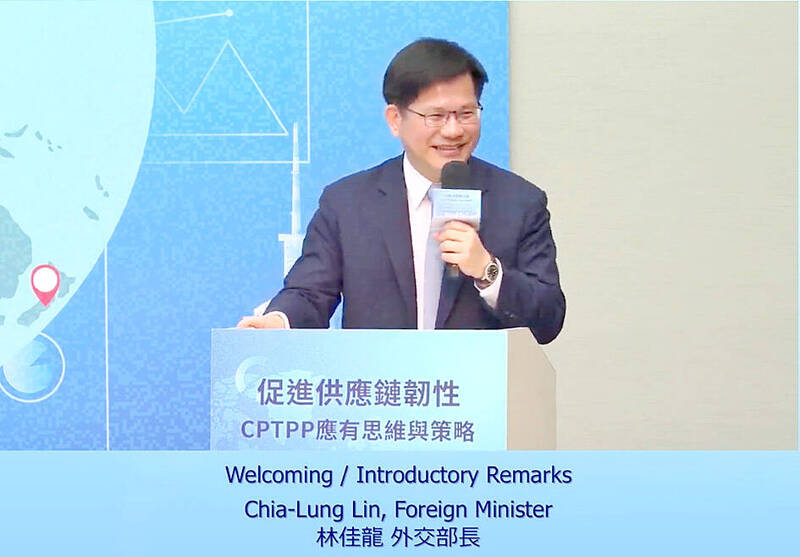《TAIPEI TIMES》Joining CPTPP key objective: minister

Minister of Foreign Affairs Lin Chia-lung speaks at a forum in Taipei yesterday. Photo courtesy of the Chung-Hua Institution for Economic Research
CREDENTIALS:Foreign minister Lin Chia-lung said that Taiwan has made significant progress in digital transformation and toward the goal of net zero carbon emissions
By Lee I-chia / Staff reporter
Joining the Comprehensive and Progressive Agreement for Trans-Pacific Partnership (CPTPP) is a key policy objective, and Taiwan’s accession to it would expand the platform’s economic and trade influences, Minister of Foreign Affairs Lin Chia-lung (林佳龍) said in a speech at a seminar in Taipei yesterday.
“The CPTPP is the most representative economic agreement in the Indo-Pacific region,” Lin told the Promoting Supply Chain Resilience — the Thinking and Strategies for the CPTPP seminar organized by the Chung-Hua Institution for Economic Research (中華經濟研究院). “As Taiwan is an export-oriented country, stable international market access is crucial for our economy.”
President William Lai (賴清德) in his inauguration address in May noted that Taiwan has applied to join the CPTPP and continues to participate in regional economic integration, Lin said.
“It is one of the government’s key policy objectives,” he said, adding that he has advocated the concept of “integrated diplomacy” — which includes value diplomacy, democracy alliance diplomacy and economic diplomacy — so CTPTT participation would be a key component of a holistic approach.
The world has faced disruptions to supply chains caused by changes in the geopolitical landscape and authoritarian states have attempted to engage in economic coercion to achieve political goals, he said.
The challenges have prompted the US, the EU and others to prioritize supply chain diversification, reduce excessive dependence on China, and adopt policies to boost economic resilience and security, he said.
Taiwan has a semiconductor industry that excels in design, system integration, research and development, and manufacturing, he said, adding that it is a world leader in information and communication technology product manufacturing.
“It underlines our critical role in maintaining economic security in the Asia-Pacific region and upholding global supply chains,” Lin said. “Clearly, Taiwan’s accession to the CPTPP would expand the platform’s economic and trade influence.”
Taiwan last year ranked 16th globally in terms of export value at US$432 billion and 19th in total trade value at US$784 billion, he said.
“Taiwan’s performance demonstrates that it has the capacity to contribute more substantially to the international trade system,” he said, adding that the nation has completed legal reforms to ensure its economic and trade system meets with the CPTPP’s requirements.
“Should Taiwan be included, it would open its market as required of all CPTPP member states,” he said.
Taiwan has been a member of the WTO for more than 22 years and has consistently honored its international commitments, despite an escalation of trade and other disputes, he said.
“Taiwan remains committed to resolving disputes and promoting a transparent, predictable and rules-based trading system,” he said.
Moreover, Taiwan has made significant progress in digital transformation, as well as advancing the goal of net zero carbon emissions by increasing cumulative renewable energy storage capacity eightfold in seven years, he added.
Taiwan’s inclusion in the CPTPP would allow the integration of its expertise into member countries’ markets and also accelerate industrial upgrading throughout the CPTPP community, he said.
CPTPP members last year agreed on the Auckland Principles for new accessions, which require potential members to meet high standards, including having a good record of complying with trade rules and commitments, and possessing the capacity to gain consensus support from CPTPP members.
“We believe and hope that member states will reach a consensus based on the first two criteria, and avoid political considerations unrelated to economic and trade issues,” he said. “All applications for membership should be treated fairly and objectively.”
Taiwan also encourages members to consult Taiwan and establish a working group for the nation’s membership, he added.
Meanwhile, Minister Without Portfolio Jenni Yang (楊珍妮), the nation’s top trade representative, in her keynote speech at the seminar said that the CPTPP represents nearly 15 percent of the global economic output, with a combined GDP of about US$15.4 trillion.
If Taiwan can join the CPTPP, it would become the sixth-largest economy in the bloc, after Japan, the UK, Canada, Mexico and Australia, she said.
“Exclusion from the CPTPP would limit Taiwan’s ability to adapt to pressing global challenges,” Yang said. “Taiwan will lose the opportunity of gaining an extra 1.6 percent of GDP growth in the long run.”
The global trading system is facing multiple challenges, including supply chain disruptions, climate change, digital transformation, cybersecurity, geopolitical tensions and economic coercion, she said.
The complexity and uncertainty require like-minded countries to work together to think about how to strike a balance between managed trade and liberal trade to safeguard their interests, she added.
Regarding what role Taiwan would play as a CPTPP member, Yang said it would be a “trusted trading partner,” as it is committed to adhering to international trade rules — even when it is not yet a CPTPP member — and it has never been involved in trade litigation or investment arbitration.
Moreover, according to the Heritage Foundation’s Index of Economic Freedom, Taiwan is the second-freest economy in Asia and fourth globally, she said, adding that Taiwan is negotiating with the US and the UK to adopt standards higher than the CPTPP on the environment, labor and digital trade.
“In joining the CPTPP, Taiwan will not be a troublemaker, but rather work together with all CPTPP members to foster a stable trade and investment environment in the Asia-Pacific region,” she said.
新聞來源:TAIPEI TIMES
















